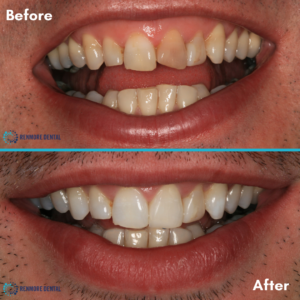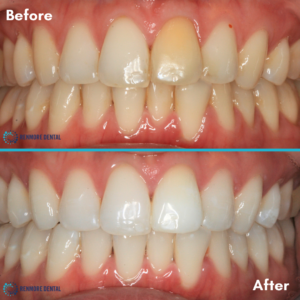Following root canal treatment or trauma, an individual tooth may become discoloured, no longer matching with the shade of the surrounding teeth.
In these cases, the tooth may be suitable for non-vital whitening, also known as internal bleaching. This is where an individual tooth is whitened from within to improve its cosmetic appearance, and ensure it blends in with the natural shade of the surrounding teeth.
How do I know if I am suitable for non-vital tooth whitening?
A consultation is essential in determining if you are suitable for internal whitening; the dentist will need to take an x-ray of the affected tooth to assess the extent of the damage and discolouration, and ensure the tooth is suitable for the treatment. If the nerve of a tooth is dying/dead but the tooth has not yet been root treated, root canal treatment will need to be carried out before any internal whitening.

What does non-vital tooth whitening process involve?
Before internal whitening is carried out on a non-vital tooth, a quick digital impression appointment is required, during which the dentist takes a digital scan of your teeth using an intraoral imaging scanner. These digital scans are then sent directly to a premium dental lab, who create a custom tooth whitening tray, specifically designed to fit your teeth.
Once your custom tray has returned to us from the dental lab, you will need a second appointment to fit the tray and begin the internal bleaching process. During this procedure, a small cavity is made in the back of the affected tooth to allow the whitening solution to enter the inside of the tooth. An internal whitening solution is applied by the dentist, and a small plug is placed over the cavity to keep it sealed.
The dentist will then provide you with detailed instructions on how to continue the internal whitening process at home; this is usually done over a period of 3 days and involves changing the gel several times throughout the day and wearing your whitening trays most of the time. Therefore, it is generally recommended that this treatment is done over a weekend for optimal results. After a few days, you will then return to the practice to have the small cavity filled with white composite material, and the process of internal whitening is complete.
Will my other teeth also whiten during non-vital tooth whitening?
Our non-vital whitening treatment only provides the gel for one tooth, however non-vital whitening is often used in combination with general whitening. Most patients that opt for internal whitening treat the discoloured tooth first, and once this tooth has reached the desired shade, general at-home whitening or KöR™ whitening is carried out on all the teeth to create a uniform level of whitening. Your dentist will always recommend which combination of whitening treatments will suit you best.

How effective is internal whitening?
Internal whitening is generally very successful in improving the aesthetics of a non-vital tooth; however the resulting shade improvement can vary depending on the cause and extent of the discolouration, and how long the tooth has been affected.
In some cases, non-vital whitening may need to be repeated after the initial treatment. Non-vital whitening may also be used in advance of a veneer or porcelain crown, to minimize any dark lines that may be visible through the crown where it is thinner at the gumline.
Is internal whitening a painful treatment?
As the affected tooth has already been treated with root canal and is non-vital, the internal whitening treatment itself is generally a painless procedure, and you should not experience sensitivity during whitening as the nerve of the tooth has been removed.
When should I avoid whitening my teeth?
Generally, we would not recommend whitening your teeth if you are currently pregnant or breastfeeding, undergoing orthodontic treatment/Invisalign, have active decay or cavities, or are suffering from any severe gum sensitivity, gingival recession or periodontal disease, etc.
If you are unsure if whitening would be a suitable treatment for you, or if you have whitened your teeth in the past and are wondering if you are still suitable to continue with regular top-up treatments, it is always best to consult with your dentist first.
How much does non-vital whitening cost?
Our non-vital whitening treatment costs between €250.00 and €450.00, depending on a patients’ individual treatment plan; therefore, we always recommend a dedicated consultation with one of our clinicians to receive an accurate quotation and discuss the treatment options that are right for you.
How do I start the teeth whitening process?
If you are interested in professional teeth whitening, we would love to hear from you! We would recommend booking a dedicated consultation with one of our clinicians to discuss which whitening option would be best for you; contact our patient care team on 091 757 678 or email info@renmoredental.ie for more information.
